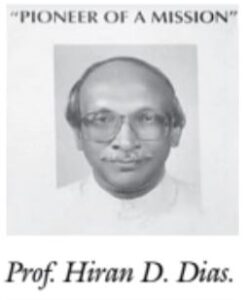by Senaka A. Samarasinghe
Prof. Hiran D. Dias passed away at the age of 89 on Feb. 28, 2023. He was born on Feb. 25, 1934 in his parental ancestral home in Panadura. His father was Charlie Dias and mother was Freda Dias. After completing his high school education at St. Thomas College, Mount Lavinia, he went to University of Cambridge, UK for Graduate Studies. In the same University in 1962 he completed his PhD in Geography and the topic of this thesis was Cottage Industries of Ceylon (now Sri Lanka).
The elder brother of Prof. Dias’s father (Mahappa) was Mr. Arthur V. Dias (1886-1960) more popularly known as Kos Mama (Uncle Jack). He was a planter by profession, a philanthropist, member of the temperance movement, independence activist, jackfruit campaign pioneer within the island, a national hero and helped educational establishments.
Paternal grandfather of Prof. Dias was Jeremias Dias from Panadura. Ms. Jeremias Dias, nee Selestina Rodrigo (1858-1933) founded a Buddhist Girls’ School in 1916, Colombo 3. In 1927, Visakha Vidyalaya was established in a 3-acre plot of land on 11th Lane (now Vajira Road). This was an era when girls’ education was not a priority even among effluent families.

After completing his studies abroad, he returned to Sri Lanka and joined University of Ceylon, Peradeniya. There he met his lifetime partner Erika a student of the same university. She was the eldest in the family of three sisters. Her loving father was Junian Jayawardena from Pȁlȁna, Weligama. University students called her ‘swan’ because she walks as a swan. Their wedding was held on 8th July 1959 in Colombo.
I came to know Prof. Hiran Dias when I was at the University of Ceylon, Colombo Campus as my geography lecturer. He was the Proctor of the Campus and promoted as the President in the late 1960s. He paddled his push bicycle with students wearing corduroy slim-fit trousers and bush shirt through the busy roads in Colombo. In 1972, when the Agrarian Research and Trancing Institute (ARTI) was established, Prof. Dias joined ARTI as a Senior Researcher.
In 1978, Prof. Dias joined the Asian Institute of Technology (AIT) in Bangkok, Thailand as a Professor of Rural Development Planning and later he was promoted as the Head of the Human Settlements Division. At the AIT, few planning service officers after completing the MSc followed short-term courses in the field of IRDP. For the graduation ceremony all faculty members of AIT used to wear a full suit along with different academic outfits; whereas Prof. Dias being very patriotic and proud of his country wore the Sri Lankan white national dress on such occasions.
In 1985, when I went to the AIT for my MSc in Human Settlements, I met him for the second time. Besides being a lecturer, he was a relation of mine as his wife Erika was a relation of my wife Chandani. When Chandani and my daughter Rowanthi joined me at the AIT (Aug. 1985), the three of us visited Prof. Dias’s home in the city of Bangkok. During that time, we used to meet Prof. Dias, Erika Akka and their two sons Neshan and Agashan very often. I can still remember when Rowanthi was sick, Prof. Dias and Erika Akka took Chandani and Rowanthi to their home in Bangkok for treatment. After nearly one week when Rowanthi was fully recovered Chandani and Rowanthi were dropped at our home in the AIT student village.
After retirement from AIT (1995), Prof. Dias and his wife Erika came back to Sri Lanka and were leading a busy life engaged in various activities. He established a consultancy firm named Vikasitha (Blossom-up) offering consultancy services. In 2009, he was the Chairperson of the Centre for Poverty Analysis (CEPA). He initiated the Non-Governmental Development Organization (NGDO) and the CHAKRA consortium to design and conduct training programmes for Managers of NGDO in Asian Region. During Prof. Dias’s retirement period he closely associated with these activities and his loving wife Erika walked along with him as a shadow.
During the era of pre-independent Sri Lanka, the paternal ancestors of Professor Hiran Dias made enormous contributions for the upliftment of society at large. Prof. Dias fully understood the post-independent situation and in his own way, as noted above, made his own contribution for the betterment of the Motherland.
Prof. Dias and Erika Akka were maintaining their sweet home as an Ashram not only to practice Dhamma daily but also to conduct dhamma discussions with their friends and relations. My dear Sir, your relentless practice of the Dhamma will certainly be of help to shorten your sojourn in Sansara.

